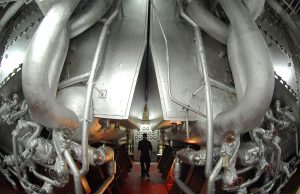
More than 100 years ago, there was already a local mine in Kiruna, and a local pulp mill in Kemi. The companies did everything by themselves. E.g. Kemi Oy had even their own farm in my home village Loue to produce the food needed at the mill and in the forests. The company owned lunch restaurants and general stores where the workers could buy almost everything. The companies owning the mills also employed all the lumberjacks working in the forests of Lapland. Almost nothing was purchased as subcontracting and everything was local or regional.
Then outsourcing started. Today number of outsourced jobs is in many cases more than double of the jobs within a mill or a mine. The outsourcing is so far mainly subcontracting and buying work. Much of it is somehow related to maintenance. In many cases, whole maintenance is outsourced as a service. A part of bonuses depends often on a usability rate. This shows that there is a tendency towards buying services.
Trend of mergers
For some decades, the trend has been in merging smaller industrial companies to form global – or at least European – enterprises. First the mergers happened on national level, then on Nordic, and later on European and global levels. Same large companies have owned pulp and paper mills, mines or steel mills especially in each of the Nordic countries for a while. It means also that major part of purchasing is performed on the company level, when it was earlier produced on local level. For subcontractors and suppliers this means that they must be capable to supply their products or services at several or all sites in broader area than in a one country. When the Northern regions of Finland, Sweden and Norway are concerned, also several smaller companies have to expand their businesses to the whole region or at least to the nearest neighbour one. The expansion gives two advantages:
- opportunity to serve the same industrial companies in both countries, which is also often a demand set by the customer
- wider market makes specialisation easier.
At the same time, the function change means that the local SMEs, served earlier the mills, must now compete with larger suppliers from other regions or countries. Even if you are not aiming to a larger market, the global competition reaches you at your home business base. Serving industry at local or regional level means thus competing in global market.

Today the trend is towards specialised knowledge-based services. For many SMEs, this means that selling work or subcontracting is not enough in the future. Now, it is the last moment to rethink your offerings. You must be able to deliver the offerings into a larger area, and you must think of how to stand out from your competitors.
This is why the Process-SME project exists and why it is an international project. In the project, we want to help SMEs to find their own slot in the larger market, and partners with whom they can develop their offerings further towards service business. We also prepare European research and innovation projects to support companies’ R&D needs. When a company already has something specialised to supply abroad, European projects are a good way to find partners and get known in the market.
Seppo Saari
Head of RDI, Industry and natural resources
Lapland University on Applied Science









